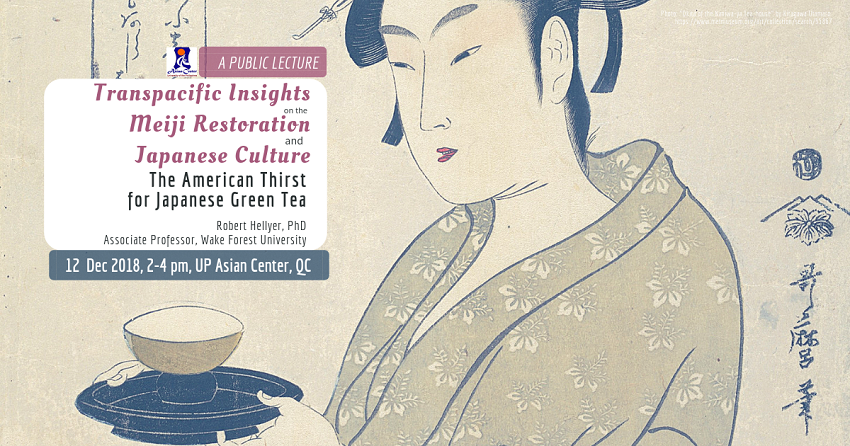
The UP Asian Center will be holding a lecture, “Transpacific Insights on the Meiji Restoration and Japanese Culture: The American Thirst for Japanese Green Tea,” on 12 December 2018, Wednesday, from 2:00 pm – 4:00 pm at the UP Asian Center, QC. The lecture is free and open to the public. Walk-ins are welcome, but interested participants are encouraged to sign up.
ABSTRACT
Soon after the Meiji Restoration in 1868, Japan dramatically expanded tea production—especially of high-quality sencha—specifically to meet demand from the United States (US), then a green tea-consuming nation. This presentation will explain how that production helped ease social tensions in the nascent Meiji nation-state by providing employment for Tokugawa retainers who had opposed the new central regime during the Boshin War (1868–1869).
It will also detail how a change in American tastes—the embrace of black tea produced in South Asia in the 1920s —brought a decline in Japanese tea exports to the US. Facing a glut, Japanese tea merchants aggressively marketed sencha locally for the first time, emphasizing its health benefits. As a result, many Japanese came to consume sencha daily, a trend that continues today.
ABOUT THE BOSHIN WAR
The Boshin War refers to the conflict between the forces of the Tokugawa Shogunate and their enemies.
ABOUT THE SPEAKER
Dr. Robert Hellyer is an Associate Professor of History at the Wake Forest University. His research interests include Japan’s foreign relations during the Edo period and the socio-economic integration of the Pacific during the eighteenth and nineteenth centuries. His current research explores Japan’s export of green tea to the US from 1850 to 1950.
INQUIRIES
For inquiries, please email This email address is being protected from spambots. You need JavaScript enabled to view it.
The Asian Center offers M.A. degrees in Asian Studies with four fields of specialization: Northeast Asia, Southeast Asia, South Asia, and West Asia. The Center also has an M.A. program in Philippine Studies that allows students to major in Philippine society and culture, Philippine foreign relations, or Philippine development studies. The Center offers a Ph.D. program in Philippine Studies in conjunction with the College of Arts and Letters and the College of Social Sciences and Philosophy. For an overview of these graduate programs, click here. The Asian Center also publishes Asian Studies: Journal of Critical Perspectives on Asia, the latest issue of which can be downloaded at the journal's website. For other news and upcoming events at the Asian Center, click here.

